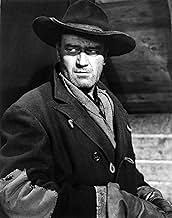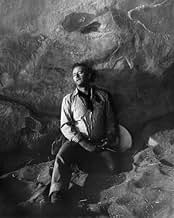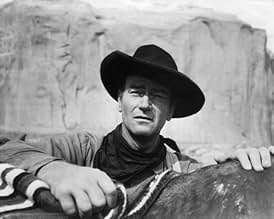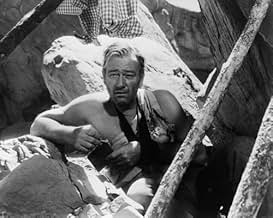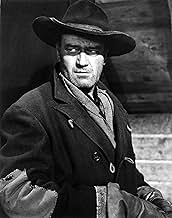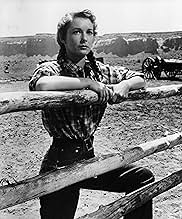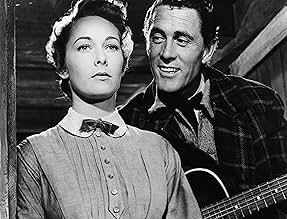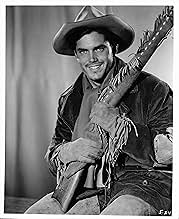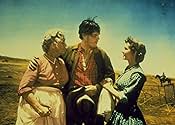An American Civil War veteran embarks on a years-long journey to rescue his niece from the Comanches after the rest of his brother's family is massacred in a raid on their Texas farm.An American Civil War veteran embarks on a years-long journey to rescue his niece from the Comanches after the rest of his brother's family is massacred in a raid on their Texas farm.An American Civil War veteran embarks on a years-long journey to rescue his niece from the Comanches after the rest of his brother's family is massacred in a raid on their Texas farm.
- Awards
- 4 wins & 4 nominations total
Patrick Wayne
- Lt. Greenhill
- (as Pat Wayne)
- Director
- Writers
- All cast & crew
- Production, box office & more at IMDbPro
Featured reviews
Even if you've never seen John Ford's THE SEARCHERS, you will have, undoubtedly, seen a film that owes it's 'style' to the film. DANCES WITH WOLVES, THE OUTLAW JOSIE WALES, UNFORGIVEN, JEREMIAH JOHNSON, and OPEN RANGE are just a few westerns that have 'borrowed' from it, but THE SEARCHERS' impact transcends the genre, itself; STAR WARS, THE English PATIENT, THE LAST SAMURAI, even THE LORD OF THE RINGS have elements that can be traced back to Ford's 1956 'intimate' epic. When you add the fact that THE SEARCHERS also contains John Wayne's greatest performance to the film's merits, it becomes easy to see why it is on the short list of the greatest motion pictures ever made.
The plot is deceptively simple; after a Comanche raiding party massacres a family, taking the youngest daughter prisoner, her uncle, Ethan Edwards (Wayne), and adopted brother, Martin Pawley (Jeffrey Hunter), begin a long quest to try and rescue her. Over the course of years, a rich tapestry of characters and events unfold, as the nature of the pair's motives are revealed, and bigoted, bitter Edwards emerges as a twisted man bent on killing the 'tainted' white girl. Only Pawley's love of his 'sister' and determination to protect her stands in his way, making the film's climax, and Wayne's portrayal of Edwards, an unforgettable experience.
With all of Ford's unique 'touches' clearly in evidence (the doorways 'framing' the film's opening and conclusion, with a cave opening serving the same function at the film's climax; the extensive use of Monument Valley; and the nearly lurid palette of color highlighting key moments) and his reliance on his 'stock' company of players (Wayne, Ward Bond, John Qualen, Olive Carey, Harry Carey, Jr, Hank Worden, and Ken Curtis), the film marks the emergence of the 'mature' Ford, no longer deifying the innocence of the era, but dealing with it in human terms, where 'white men' were as capable of savagery as Indians, frequently with less justification.
Featuring 18-year old Natalie Wood in one of her first 'adult' roles, the sparkling Vera Miles as Pawley's love interest, Wayne's son Patrick in comic relief, and the harmonies of the Sons of the Pioneers accenting Max Steiner's rich score, THE SEARCHERS is a timeless movie experience that becomes richer with each viewing.
It is truly a masterpiece!
The plot is deceptively simple; after a Comanche raiding party massacres a family, taking the youngest daughter prisoner, her uncle, Ethan Edwards (Wayne), and adopted brother, Martin Pawley (Jeffrey Hunter), begin a long quest to try and rescue her. Over the course of years, a rich tapestry of characters and events unfold, as the nature of the pair's motives are revealed, and bigoted, bitter Edwards emerges as a twisted man bent on killing the 'tainted' white girl. Only Pawley's love of his 'sister' and determination to protect her stands in his way, making the film's climax, and Wayne's portrayal of Edwards, an unforgettable experience.
With all of Ford's unique 'touches' clearly in evidence (the doorways 'framing' the film's opening and conclusion, with a cave opening serving the same function at the film's climax; the extensive use of Monument Valley; and the nearly lurid palette of color highlighting key moments) and his reliance on his 'stock' company of players (Wayne, Ward Bond, John Qualen, Olive Carey, Harry Carey, Jr, Hank Worden, and Ken Curtis), the film marks the emergence of the 'mature' Ford, no longer deifying the innocence of the era, but dealing with it in human terms, where 'white men' were as capable of savagery as Indians, frequently with less justification.
Featuring 18-year old Natalie Wood in one of her first 'adult' roles, the sparkling Vera Miles as Pawley's love interest, Wayne's son Patrick in comic relief, and the harmonies of the Sons of the Pioneers accenting Max Steiner's rich score, THE SEARCHERS is a timeless movie experience that becomes richer with each viewing.
It is truly a masterpiece!
If there is only one western that you must see from John Ford, I would say it is this one; though THE MAN WHO SHOT LIBERTY VALENCE is also absolutely unique, outstanding too. The element that makes those two films so stunning is not only the directing but the plot. This scheme was never made before and rarely copied since. Of course THE SEARCHERS plot will more or less inspire THE PROFESSIONALS, one decade later, from director Richard Brooks; just the overall scheme and especially ending, moral. The settings, landscape, music, acting, characters, everything is jawdropping and provokes emotion for anyone sensitive enough to feel all the power of this terrififc western. John Wayne gives his best performance, even better than in WAKE OF THE RED WITCH. One of the greatest ending ever.
John Ford is a classic Western filmmaker (though certainly not the only genre in which he excelled), employing the classic Western film star, John Wayne, in perhaps one of the most underappreciated films of our time. Ford builds a thoroughly entertaining movie which explores classic Western themes without necessarily relying on these themes to drive the plot.
Like any good Western, we are inorexably drawn to a kind of Cowboys vs. Indians saga, but Ford manages to draw us into the conflict in such a way that the mere "Cowboys good, Indians bad" aesthetic isn't really applicable here. While relying on the archetypical roles of the two groups to set up a conflict, Ford is ahead of his time in managing to characterize the Indians as more than "noble savages". Wayne's character's (Ethan Edwards) hatred of "the Commanch" is called into question a number of times, especially in his stormy relationship with adopted nephew and fellow searcher Martin Pawley (Jeffrey Hunter), who we are told is a quarter-Indian himself, and cannot bring himself to find the same sort of hatred for the Indians that Ethan holds.
Ethan was a Confederate soldier in the Civil War, returning to his brother's Texas homestead after the war. A group of Commanches, led by the ominous Chief Scar, route and kill his brother's family while Ethan and Martin are investigating a cattle rustling, the Commaches' diversionary tactic. The Indians took the family's youngest daughter, and the majority of the film has us following Ethan and Martin in their attempts to track down Scar and take back the girl, Debbie (played by Lorna and Natalie Wood, at different times).
Such a situation sets up one of the many moral ambiguities that make this more than an ordinary Western: the Commanches slaughtered Ethan's brother and his family - he seemingly has reason to hate them with the almost crazy passion that he does. Yet the more naive Martin cannot bring himself to hate them in such a way, and the split between them becomes a major point of contention when it becomes clear that Debbie has more or less been adopted as a Commanche (the two "Searchers" chase after her for about five years in film time). Furthermore, when the two "Searchers" actually meet Scar, who they've been chasing for years, he is presented as a rather intelligent character, although certainly one filled with vengance - he, too, has his reasons for waging war with the likes of Ethan and Martin, and cannot merely be written off a the type of bloodthirsty savage that is typical of the portrayal of most Indians within the genre.
The film relies on enough classic Western material to imbue with the feel with the sense of such pictures. Aside from the question of Ethan's morality, Wayne plays him with classic John Wayne freewheeling confidence and swagger that made the actor such an icon, and it comes off quite well. We are also given a side story involving Martin's romance with the hard-as-nails Laurie Jurgensen (played by Vera Miles, best known for playing Janet Leigh's sister in "Psycho"). The relationship is from a classic, archetypical Western mold - the two have been in love since they were kids, but Martin has responsibilites to his family that stop him from making the proper time for his beau, and his rough frontier-uprbringing leave him seemingly lacking the proper sensitivity for dealing with Laura (though he does, of course, have a heart of gold).
As a side note, this film should prove immensely interesting to any serious fan of the "Star Wars" trilogy (the original one). While those films undoubtably draw a great deal of inspiration from Kurosawa's samurai films, there is most certainly a great deal (especially in the film subtitled "A New Hope") drawn from here. One scene in particular (when Luke returns to his farm after stormtroopers have blasted in pieces) is virtually ripped straight from "The Searchers". Ford's film is also full of the sort of gallows humor present throughout the trilogy, and even incorporates some rather goofy characters, the half-cracked Mose Harper (Hank Warden) and the incredibly over-the-top rival for Laura's hand Charlie McCorry (Ken Curtis), without ruining the overall serious feel of the film, but managing to squeeze laughs out of absurd situations (such as a fight between Martin and Charlie) without compromising the ability to quickly return to a solemn tone. Such deft touch, as well as the addition of wise-cracking dialogue (provided largely by Wayne and Ward Bond here) are a large part of what made the original trilogy so successful, and it's strikingly similar to the type of paradigm on display between various characters here.
Regardless of ranting and raving about Star Wars, however, this is an excellent film on it's own merit.
Like any good Western, we are inorexably drawn to a kind of Cowboys vs. Indians saga, but Ford manages to draw us into the conflict in such a way that the mere "Cowboys good, Indians bad" aesthetic isn't really applicable here. While relying on the archetypical roles of the two groups to set up a conflict, Ford is ahead of his time in managing to characterize the Indians as more than "noble savages". Wayne's character's (Ethan Edwards) hatred of "the Commanch" is called into question a number of times, especially in his stormy relationship with adopted nephew and fellow searcher Martin Pawley (Jeffrey Hunter), who we are told is a quarter-Indian himself, and cannot bring himself to find the same sort of hatred for the Indians that Ethan holds.
Ethan was a Confederate soldier in the Civil War, returning to his brother's Texas homestead after the war. A group of Commanches, led by the ominous Chief Scar, route and kill his brother's family while Ethan and Martin are investigating a cattle rustling, the Commaches' diversionary tactic. The Indians took the family's youngest daughter, and the majority of the film has us following Ethan and Martin in their attempts to track down Scar and take back the girl, Debbie (played by Lorna and Natalie Wood, at different times).
Such a situation sets up one of the many moral ambiguities that make this more than an ordinary Western: the Commanches slaughtered Ethan's brother and his family - he seemingly has reason to hate them with the almost crazy passion that he does. Yet the more naive Martin cannot bring himself to hate them in such a way, and the split between them becomes a major point of contention when it becomes clear that Debbie has more or less been adopted as a Commanche (the two "Searchers" chase after her for about five years in film time). Furthermore, when the two "Searchers" actually meet Scar, who they've been chasing for years, he is presented as a rather intelligent character, although certainly one filled with vengance - he, too, has his reasons for waging war with the likes of Ethan and Martin, and cannot merely be written off a the type of bloodthirsty savage that is typical of the portrayal of most Indians within the genre.
The film relies on enough classic Western material to imbue with the feel with the sense of such pictures. Aside from the question of Ethan's morality, Wayne plays him with classic John Wayne freewheeling confidence and swagger that made the actor such an icon, and it comes off quite well. We are also given a side story involving Martin's romance with the hard-as-nails Laurie Jurgensen (played by Vera Miles, best known for playing Janet Leigh's sister in "Psycho"). The relationship is from a classic, archetypical Western mold - the two have been in love since they were kids, but Martin has responsibilites to his family that stop him from making the proper time for his beau, and his rough frontier-uprbringing leave him seemingly lacking the proper sensitivity for dealing with Laura (though he does, of course, have a heart of gold).
As a side note, this film should prove immensely interesting to any serious fan of the "Star Wars" trilogy (the original one). While those films undoubtably draw a great deal of inspiration from Kurosawa's samurai films, there is most certainly a great deal (especially in the film subtitled "A New Hope") drawn from here. One scene in particular (when Luke returns to his farm after stormtroopers have blasted in pieces) is virtually ripped straight from "The Searchers". Ford's film is also full of the sort of gallows humor present throughout the trilogy, and even incorporates some rather goofy characters, the half-cracked Mose Harper (Hank Warden) and the incredibly over-the-top rival for Laura's hand Charlie McCorry (Ken Curtis), without ruining the overall serious feel of the film, but managing to squeeze laughs out of absurd situations (such as a fight between Martin and Charlie) without compromising the ability to quickly return to a solemn tone. Such deft touch, as well as the addition of wise-cracking dialogue (provided largely by Wayne and Ward Bond here) are a large part of what made the original trilogy so successful, and it's strikingly similar to the type of paradigm on display between various characters here.
Regardless of ranting and raving about Star Wars, however, this is an excellent film on it's own merit.
A lone home amidst tranquil mesas. A family gathers on their front porch to watch a solitary man ride slowly up to their ranch on his horse in the waning sun. He stops, disembarks and walks up to the house, all in one single weary move. Note his stance, the rugged tiredness of life etched on his face. This lone drifter is Ethan Edwards (John Wayne) and is perhaps the most brilliant character devised by Wayne and director John Ford. As the film progresses, we learn of his military days, his contempt of Indians and, most importantly, his psyche. Compared to another John ford movie, "Stagecoach", we can see the massive differences in character psychology and within the genre itself. Gone are the days of the brave hero riding in to save the day with wistful smiles all around; instead we have a savage man on an odyssey of revenge, hatred and bloodshed.
In one scene, Ethan and a search party comes across a dead Indian buried in the ground. Ethan's suppressed rage overcomes him, and he shoots the corpse's eyes out. "What good did that do ya?" asks the Reverend. Ethan coolly replies, "Ain't got no eyes so he can't enter the spirit land, has to wander forever between the winds". This is by far my favourite line in the movie, because of the resonance it has at the end, with Ethan walking away into the winds, doomed to forever drift the earth. This movie is a beautiful spectacle of sight and sound. Not only do we marvel at scenes in Ford's beloved Monument Valley, we also find ourselves amazed at the level of detail in set design. Each frame is as if it were from a painter's canvas. Colour coordination was certainly something John Ford and his cinematographers fit perfectly into. There are few vibrant colours in each frame, but those that exist pop out vividly amongst the bleak, sepia-stained walls of the houses, and the valley.
John Ford again demonstrates his powerful storytelling technique by using several methods of progressing the narrative. While crosscutting between action is used sparingly, a quasi-flashback stemming from a letter of Luke's kept my attention firmly rooted to my screen. These different methods of narrative progression are important because it keeps the viewer continuously involved with the story. Not once did I feel as if a particular scene droned on and on for too long, instead I felt captivated not only by a gripping storyline, but also because of the brilliant dichotomy between Ethan Edwards and the other characters. The Searchers is a lesson on psychology, sociology and filmmaking all at once. I love it.
In one scene, Ethan and a search party comes across a dead Indian buried in the ground. Ethan's suppressed rage overcomes him, and he shoots the corpse's eyes out. "What good did that do ya?" asks the Reverend. Ethan coolly replies, "Ain't got no eyes so he can't enter the spirit land, has to wander forever between the winds". This is by far my favourite line in the movie, because of the resonance it has at the end, with Ethan walking away into the winds, doomed to forever drift the earth. This movie is a beautiful spectacle of sight and sound. Not only do we marvel at scenes in Ford's beloved Monument Valley, we also find ourselves amazed at the level of detail in set design. Each frame is as if it were from a painter's canvas. Colour coordination was certainly something John Ford and his cinematographers fit perfectly into. There are few vibrant colours in each frame, but those that exist pop out vividly amongst the bleak, sepia-stained walls of the houses, and the valley.
John Ford again demonstrates his powerful storytelling technique by using several methods of progressing the narrative. While crosscutting between action is used sparingly, a quasi-flashback stemming from a letter of Luke's kept my attention firmly rooted to my screen. These different methods of narrative progression are important because it keeps the viewer continuously involved with the story. Not once did I feel as if a particular scene droned on and on for too long, instead I felt captivated not only by a gripping storyline, but also because of the brilliant dichotomy between Ethan Edwards and the other characters. The Searchers is a lesson on psychology, sociology and filmmaking all at once. I love it.
A second look at this film is long overdue. It's been hailed by many as a masterpiece. Even the anti-Ford critic David Thomson in The New Biographical Dictionary of Film classifies it as an exceptional work. I don't know whether it's the Ford mystique, the Wayne icon, or the mesmerizing beauty of Monument Valley that holds this movie to a different standard from most Westerns. But something is at work that numbs a critical eye-level inquiry. The Searchers is a good film, but no masterpiece, and certainly does not belong in the American Film Institute's list of top 100 films of all time. A brief look at some of the more obvious defects:
Ford makes picture postcards out of the soaring spires and buttes. At no point, however, does he come to grips with the real harshness of the terrain. This is desert country. Hardly anything grows-- just look at the sparseness of greenery. Yet we're told cattle herds feed here in large enough numbers to support families, (In the movie, Jorgensen's right-- they would be better off raising pigs than cattle). Then too, there is absolutely no hint of the desert heat or cold affecting anything or anybody. The parties go here and there with slim regard for what the conditions actually afford. In short, the celebrated landscape amounts to little more than a majestic backdrop without a true reality of its own. Ford may love this Spartan terrain, but he gives it scant respect.
Similarly, the film-maker undercuts the naturalism of the vaunted visuals. The audience gets an awesome flow of natural wonders, only to have the flow interrupted by outdoor sets so painfully obvious, they can't be ignored, (consider the Futterman ambush scene, for one). As a result, visual continuity is sacrificed and so is fidelity to the intended atmosphere. Suddenly we're jolted out of the scenic spell back into recognition that this is, after all, only a movie. Where, one wonders, was Ford's very real poetic eye in these disruptive scenes, and why didn't he insist on shooting all outdoor scenes outdoors-- especially after traveling to Colorado for the great snow scenes. As a premier film-maker, I'm sure he had the clout. Nonetheless, the lapse is another glaring defect.
There's another problem with respect, this time for the adversary. In fact, the Indians do get some concessions--Scar is provided a moment of motivation and a good sarcastic aside-- but not much else. As in Ford's cavalry cycle, aboriginal peoples still exist as convenient devices and sitting ducks. From the film's several battles, it seems the Indians know nothing about combat tactics. Stupidly, they never attack unless an escape route is left open to the fleeing settlers. And when they attack frontally across the river or in front of the cave, they mass in a bunch so the dug-in whites can hardly miss. No wonder there are so few Indians left. In most Westerns, this cliché would not even merit comment, but remember this one's supposed to be a "masterpiece".(For a gauge of Ford's dishonesty, compare his cardboard warriors with the skilled and savvy combatants in the similarly themed "Ulzana's Raid" {1973}).
For what is required of the actors, contrast the first ten minutes with the movie's remainder. Those first few minutes are little short of superb. There's a low-key naturalism and subtlety that's fascinating-- Just who is Ethan Edwards? What is the tension between his brother and him? And where did he get that impressive war medal? The well-crafted impression is that of real people concealing true feelings, while groping toward some kind of reconciliation across unspoken barriers. Then Ward Bond and the posse arrive and slam-bang stereotypes take over. The promising beginning is lost, while Ford reverts to form by replacing character with caricature. Bond, for example, stands not just as a gruff old man, but as The Gruff Old Man; Jeffrey Hunter is not just a callow youth, but The Callow Youth; and most egregiously, Ken Curtis is not merely one more country yokel, but The Rub-your-Nose-In-It Country Yokel. Moreover, conversation ceases, hat-throwing and shouting take over, and genuine interaction gives way to exaggerated personalities doing little more than bouncing off one another. Even Wayne's one-note avenger comes close to parody, (unlike others, however, he is never mocked). Of course, such caricatures provide ample grist for Ford's broad idea of humor. Nonetheless, the comic set-ups come perilously close at times to a Three Stooges level, particularly the scenes with Old Mose, and with Bond and Patrick Wayne. I'm not against comic relief, but I am when it flirts with burlesque in an otherwise serious film.
More could be pointed out, such as the distracting subplots, or the ludicrous wedding sequence, or most glaringly, the climax with its sudden, unmotivated change of heart-- after all, it's the racial conflict that drives the plot. I guess what really bothers me is how blithely Ford substitutes his own highly simplistic vision of the Old West for any really plausible version. There's a basic lack of respect for the material, which allows, for example, such facile touches as Jorgensen's unweathered two-story wooden house in the middle of the desert, or Vera Miles' brocaded form-fitting wedding gown that appears to have been flown in from Paris. My point is not that the film lacks merit-- the justly celebrated doorway shots, for example. Rather, it's one of perspective-- this is an entertaining film but far from a masterpiece.The Searchers may be lauded and popular with many. Nonetheless, beneath the glossy surface lies an under-developed theme that really deserved better than standard stock company treatment. In short, Thomson is wrong. The Searchers is not an exception to Ford's usual product. Rather, it's just a little less compromised.
Ford makes picture postcards out of the soaring spires and buttes. At no point, however, does he come to grips with the real harshness of the terrain. This is desert country. Hardly anything grows-- just look at the sparseness of greenery. Yet we're told cattle herds feed here in large enough numbers to support families, (In the movie, Jorgensen's right-- they would be better off raising pigs than cattle). Then too, there is absolutely no hint of the desert heat or cold affecting anything or anybody. The parties go here and there with slim regard for what the conditions actually afford. In short, the celebrated landscape amounts to little more than a majestic backdrop without a true reality of its own. Ford may love this Spartan terrain, but he gives it scant respect.
Similarly, the film-maker undercuts the naturalism of the vaunted visuals. The audience gets an awesome flow of natural wonders, only to have the flow interrupted by outdoor sets so painfully obvious, they can't be ignored, (consider the Futterman ambush scene, for one). As a result, visual continuity is sacrificed and so is fidelity to the intended atmosphere. Suddenly we're jolted out of the scenic spell back into recognition that this is, after all, only a movie. Where, one wonders, was Ford's very real poetic eye in these disruptive scenes, and why didn't he insist on shooting all outdoor scenes outdoors-- especially after traveling to Colorado for the great snow scenes. As a premier film-maker, I'm sure he had the clout. Nonetheless, the lapse is another glaring defect.
There's another problem with respect, this time for the adversary. In fact, the Indians do get some concessions--Scar is provided a moment of motivation and a good sarcastic aside-- but not much else. As in Ford's cavalry cycle, aboriginal peoples still exist as convenient devices and sitting ducks. From the film's several battles, it seems the Indians know nothing about combat tactics. Stupidly, they never attack unless an escape route is left open to the fleeing settlers. And when they attack frontally across the river or in front of the cave, they mass in a bunch so the dug-in whites can hardly miss. No wonder there are so few Indians left. In most Westerns, this cliché would not even merit comment, but remember this one's supposed to be a "masterpiece".(For a gauge of Ford's dishonesty, compare his cardboard warriors with the skilled and savvy combatants in the similarly themed "Ulzana's Raid" {1973}).
For what is required of the actors, contrast the first ten minutes with the movie's remainder. Those first few minutes are little short of superb. There's a low-key naturalism and subtlety that's fascinating-- Just who is Ethan Edwards? What is the tension between his brother and him? And where did he get that impressive war medal? The well-crafted impression is that of real people concealing true feelings, while groping toward some kind of reconciliation across unspoken barriers. Then Ward Bond and the posse arrive and slam-bang stereotypes take over. The promising beginning is lost, while Ford reverts to form by replacing character with caricature. Bond, for example, stands not just as a gruff old man, but as The Gruff Old Man; Jeffrey Hunter is not just a callow youth, but The Callow Youth; and most egregiously, Ken Curtis is not merely one more country yokel, but The Rub-your-Nose-In-It Country Yokel. Moreover, conversation ceases, hat-throwing and shouting take over, and genuine interaction gives way to exaggerated personalities doing little more than bouncing off one another. Even Wayne's one-note avenger comes close to parody, (unlike others, however, he is never mocked). Of course, such caricatures provide ample grist for Ford's broad idea of humor. Nonetheless, the comic set-ups come perilously close at times to a Three Stooges level, particularly the scenes with Old Mose, and with Bond and Patrick Wayne. I'm not against comic relief, but I am when it flirts with burlesque in an otherwise serious film.
More could be pointed out, such as the distracting subplots, or the ludicrous wedding sequence, or most glaringly, the climax with its sudden, unmotivated change of heart-- after all, it's the racial conflict that drives the plot. I guess what really bothers me is how blithely Ford substitutes his own highly simplistic vision of the Old West for any really plausible version. There's a basic lack of respect for the material, which allows, for example, such facile touches as Jorgensen's unweathered two-story wooden house in the middle of the desert, or Vera Miles' brocaded form-fitting wedding gown that appears to have been flown in from Paris. My point is not that the film lacks merit-- the justly celebrated doorway shots, for example. Rather, it's one of perspective-- this is an entertaining film but far from a masterpiece.The Searchers may be lauded and popular with many. Nonetheless, beneath the glossy surface lies an under-developed theme that really deserved better than standard stock company treatment. In short, Thomson is wrong. The Searchers is not an exception to Ford's usual product. Rather, it's just a little less compromised.
Did you know
- TriviaBeulah Archuletta (Look) was found crying in one of the tipis by John Wayne in between shooting scenes. When Wayne asked her why she was crying, she responded that she was going to miss her son's wedding because she was filming her scenes at the time. Wayne stopped production of the film for a few days and flew her to California so that she could attend the wedding.
- GoofsThe "dead" Indian under the rock, when the rock is removed, is clearly breathing.
- Crazy creditsThe credits state this Warner Brothers film is in VistaVision; this may be the only Warner film in VistaVision.
- ConnectionsEdited into Histoire(s) du cinéma: Fatale beauté (1994)
- SoundtracksThe Searchers (Main Theme)
Composed by Max Steiner
Lyrics by Stan Jones
Sung by Sons of the Pioneers (uncredited)
Details
Box office
- Budget
- $3,750,000 (estimated)
- Gross worldwide
- $1,071
- Runtime1 hour 59 minutes
Contribute to this page
Suggest an edit or add missing content






